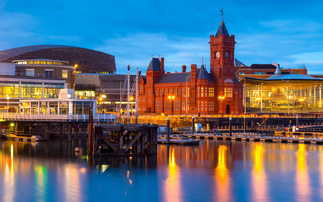Inspiring speeches and a flurry of major commitments suggest the two Secretaries of State may have been let off the climate leash
I was on holiday on Friday so it was late in the day before I caught up with Michael Gove's tour de force speech on the opportunity to deliver a 'green Brexit'.
It was worth the wait.
If you judge the speech solely by its content, rather than by the Environment Secretary's somewhat deserved reputation for politically expedient slipperiness, then it genuinely was the most impressive speech on environmental and economic issues delivered by a frontline British politician in as long as I can remember.
I reported as much in a short Twitter thread describing Gove's intervention as "eloquent, ambitious, reasoned, inspiring, and full of clear commitments" and hailing its full spectrum inclusion of "economic, security, and human rationales for environmental action; a full-throated rejection of climate scepticism; criticism of Trump and his reckless take on climate risks; a paean to clean tech potential; an ode to science-based evidence; even a disavowal of laissez faire neoliberalism in the praise for regulation and acknowledgement of govt role in tech development".
On holiday today, so only just got round to reading the full @michaelgove speech... https://t.co/5mmS82SBT0 /1
— James Murray (@James_BG) July 21, 2017
I also acknowledged that this praise came with the obvious caveat that like most environmentalists I regarded many of Gove's recent antics with contempt, continue to think the risks of Brexit outweigh the opportunities, and have plenty of questions about the government's ability to deliver on this ambitious vision.
But, perhaps inevitably, this caveat was not enough for some fellow Friday evening Tweeters. The most polite described such a fulsome welcome for Gove's speech as "surprising", others suggested Defra would have to manage pigs that were airborne under their own propulsion before the Environment Secretary delivered on any of his promises, while one implied that I was a 'quisling' for abetting the 'hard right' of British politics - an accusation, which given its etymology, fails Godwin's Law.
Of course, it is Gove's cross to bear that he is not regarded as the most credible witness, even when talking about his own intentions. If you front a campaign that took a 'win at all costs' approach to deploying deeply dubious claims, before then knifing your closest ally in the back while u-turning on your insistence you did not want to become Prime Minister, then you should understand why your attempts at conciliation are taken with enough salt to break a desalination plant.
There are good reasons to be deeply sceptical about Gove's professed desire for a green Brexit. It is easy to see how it could be an exercise in cynical politicking from a politician who has finally recognised that he needs to build bridges with the officials and stakeholders he now has to work with (although in this instance the results are much more important than the motivation).
Equally, even if Gove is genuinely and deeply committed to delivering a new wave of environmental action it is unclear if he will be able to come good on this vision. The government's grip on power remains shaky and there is no reason to think a summer break will bring an end to recent leadership speculation. Gove's stint at Defra could be over before the leaves are off the trees.
Even if the government digs in, Gove's commitment to climate action, agricultural subsidy reform, and robust environmental protection faces gale force headwinds. There are plenty of storm clouds between here and the newly forested sunlit uplands. The Conservative right and their allies in the media will be furious at the government's ambition on climate change and willingness to retain and strengthen EU environmental rules; some farmers are already agitating over the prospect of subsidy payments linked to environmental results; Brexit complexity could put paid to Gove's hopes for agricultural and fisheries reform; a weak pound and post-Brexit struggling economy would only damage the government's hopes of establishing the UK as a world leader in environmental policy and clean technology.
But, while keeping all these concerns in mind, read the speech again, and then consider it in tandem with the Greg Clark's announcement today on fresh funding for battery storage, Ofgem's new strategy for supporting the emerging smart grid, the promise of more support through the Industrial Strategy for technical skills development, and the flurry of recent stories on the plummeting cost of clean energy.
Quietly, but inexorably, something really exciting is happening in the green economy.
As Arup's report today makes clear, onshore wind farms could now be delivered with effectively zero subsidy and all the evidence suggests solar projects are not far behind. Indeed, a number of developers, while acknowledging life would be easier with subsidy-free price contracts, are forging ahead with plans for wind and solar farms that could be built and underpinned by corporate power purchase agreements (PPAs). The government could yet be convinced to provide the clear route to market that would turbo charge these industries and help hold down energy bills. At the same time, hopes are escalating that the offshore wind industry will this autumn confirm a level of price competitiveness that will blow renewables' detractors out of the water and enable a new wave of large scale clean energy development.
These cost reductions are occurring in tandem with the falling cost and growing maturity of the energy storage and smart grid technologies that are at the heart of the government's announcements today. They are further reinforced with the rapid progress that is being made on electric vehicles - as evidenced this weekend by the opening of the UK's first multi-brand EV showroom - which can expect a further boost in the coming weeks with the announcement of first the government's new Clean Air Plan, and then the long-awaited Clean Growth Plan.
It is increasingly clear that much of the UK's decarbonisation agenda is now going with the flow of market forces, as clean technologies start to out-compete dirty incumbents. Moreover, it is also more in tune with political forces than at any point in recent history. The Conservative Party has finally realised it needs to deliver both an economically successful Brexit and reach out to younger voters - it takes a particular type of ideologically-informed myopia to fail to recognise the crucial role the green economy can play in delivering on these goals. Theresa May's travails could even inadvertently lead to bolder green policies, as Gove, Clark, and others are given more freedom to pursue priorities that are close to their heart.
Moreover, if the current political turbulence continues and there is a change of government, Labour, the Lib Dems, and the SNP are, if anything, even more ambitious on the pace of decarbonisation they want to see - they would surely seek to build on the government's plans for smart grids, clean energy, electric vehicles, and agricultural subsidy reform, rather than seek to tear them down.
Of course, it is important not to be Panglossian. The government is still failing to deliver the fully co-ordinated climate action programme the UK needs, as evidence by the axing of rail electrification investment and the confusion over the future of Euratom, to cite just two recent examples. Moreover, as the today's report from the REA notes with the kind of timing that will no doubt infuriate those within government hoping to generate only positive headlines for their clean tech announcements, green jobs growth has stalled in recent years thanks to the investment slowdown government policy changes have engineered. We could be much further ahead than where we are currently.
But it is hard to deny that a number of political, economic, and technical trends are currently conspiring to increase the chances of a huge leap forward for the green economy. Gove's green renaissance and promise to completely retain environmental protections and overhaul environmental subsidies, coupled with Clark's industrial strategy and promise to provide the UK with a clean infrastructure upgrade should soon be inscribed in the long-awaited 25 Year Plan for Nature and Clean Growth Plan. Policy clarity and government backing - acknowledged last week as essential by a politician once more closely associated than most with neo-liberal, small state, neo-conservatism - should unlock waves of new investment and technological transition that promise to make the UK more competitive, more attractive, and more resilient.
I've just finished reading Tim Shipman's epic history of the referendum campaign All Out War and one of the most striking aspects of the Vote Leave campaign was the extent to which its intellectual rationale was an unwavering belief in creative destruction - that exiting the EU could be the trigger for the wholesale reform of Whitehall and re-engineering of the UK's economy and technology base, which Gove and his allies believed was necessary to build a country fit for the 21st century. It was a deeply reckless and fundamentally anti-conservative gamble, which could yet lead to disaster. On the environmental front many of the reforms that are required to deliver a low carbon economy could have been enacted from within the EU, and as the think tank Green Alliance makes clear today we increase the chances of making a success of Brexit if we continue to work very closely with the EU on energy and climate issues.
But creative destruction does bring with it the chance of creation as well as destruction. Brexit need not derail the UK's decarbonisation journey and offers an opportunity to enhance rather than dilute the UK's environmental policy regime, whether we eventually go through with leaving the bloc or not. Could Michael Gove and Greg Clark emerge as the slightly unlikely allies who deliver on this welcome and ambitious vision?
There are reasons to be cautiously optimistic, and you don't have to make any judgement on Michael Gove's motives to recognise them.









